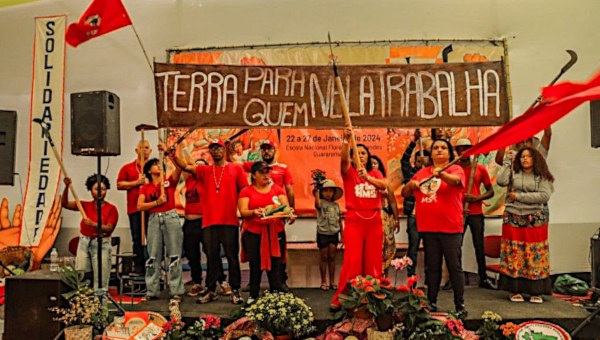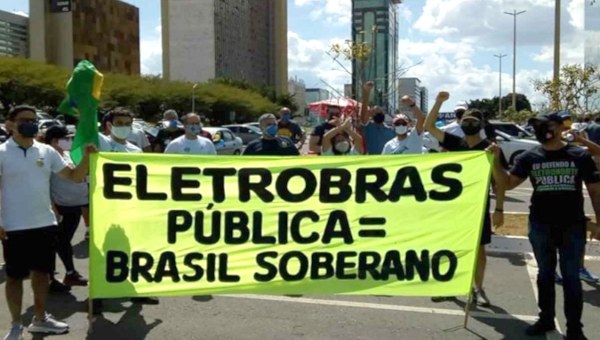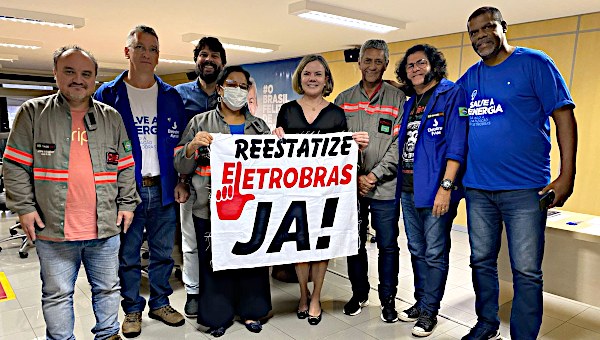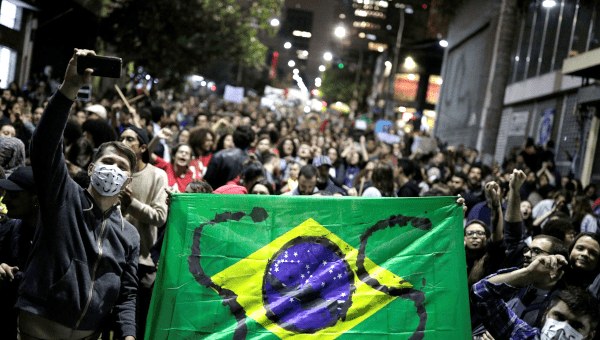Brazil and Bolsonaro: Political Consolidation and New Corruption Scandals
The arrangements between Brazilian political parties for the upcoming October presidential and state elections are almost complete. Until March 31 of this year, the political system permitted members of Parliament to switch between political parties. As there are 23 parties represented in Parliament, with often very loose ideological frameworks, such changes can be quite significant, and this year was not an exception.
In the first months of this year a huge influx of representatives into the Liberal Party (PL) took place, which President Jair Bolsonaro joined at the end of 2021 after remaining without party affiliation for more than two years. The number of PL delegates in the Congress grew from 43 to 75, and that party is now the largest parliamentary group.
Bolsonaro’s former party, the Social Liberal Party (PSL), was split between his followers and detractors, and it recently fused with the right-wing Democrats Party (DEM) in order to form the new Brazil Union party (União Brasil, UB). Twenty-nine of the 32 new members of the PL in Parliament come from the UB, and in this way, Bolsonaro has consolidated his power base in Congress in quite a spectacular fashion.
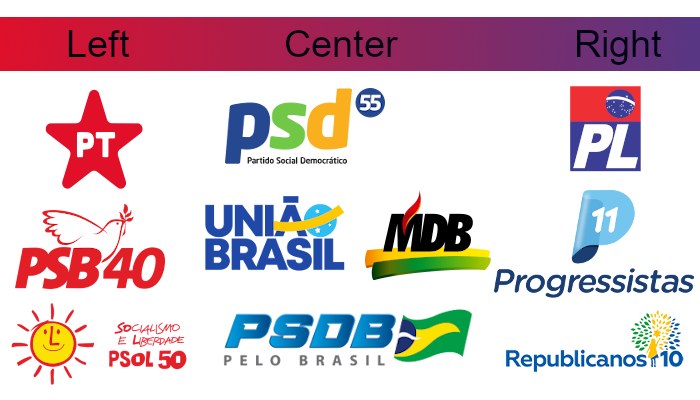
Changing Affiliations
The two other parties forming Bolsonaro’s base in Congress are the Progressistas (PP) and the Republicanos. The PP shares second place in Parliament with the left-wing Workers Party (PT), each party comprising 56 members.
The PT was the largest party in Parliament before the changes in party affiliation, but the PP gained 14 members in the process by the end of March. The Republicanos, with 40 members, is the sixth largest, and the three parties – the PL, the Republicanos, and the PP – together account for exactly one third of delegates, which is an unusually solid power base in Brazilian politics. The PT, for example, never had more than 19 percent of seats in Parliament in the past and therefore depended frequently on alliances.
The center-right bloc represents the next largest group of parties in Parliament, which seeks to distinguish itself from the Bolsonaro government. This bloc comprises the UB with 52 members, the Social Democratic Party (PSD) with 44, the Brazilian Democratic Movement (MDB) with 37, and the Brazilian Social Democratic Party (PSDB) with 25.
Some of these parties plan to launch a joint third candidate for the presidency in May, after former Minister of Justice Sérgio Moro gave up on his presidential ambitions in early April. Moro ran on the ticket of the right-wing party Podemos (We Can) and did not fare well in opinion polls. Since Podemos has only 9 seats in Parliament, and therefore would get very little airtime for television spots, Moro left the party and joined the UB so as to secure a seat in the next Parliament.
The traditional center-right parties, the MDB and the PSDB, failed to recover from their 2018 electoral debacles. A section of the MDB is considering launching a female candidate for the presidential race, Simone Tebet, who gained recognition in a parliamentary commission investigating the handling of the pandemic by the Bolsonaro government. Other sections of the party, a group led by Renan Calheiros, another leading figure in the parliamentary commission, might support Lula da Silva’s bid for the presidency in the first round of elections.
The PSDB is in a state of utter confusion. The party supported the deeply unpopular governor of São Paulo state, João Doria, as its presidential candidate, but the younger, more popular, and openly gay Eduardo Leite from Rio Grande do Sul is building up his own campaign, and together with Tebet, is one of the likely candidates for the so-called third option which the center-right aims to launch.
Toward the October Showdown
The positions of Lula and Bolsonaro have remained unchanged in opinion polls since June 2021: Lula would get 54 percent in the second round of voting and Bolsonaro 33 percent. Lula did somewhat better in a November survey, and Bolsonaro has since regained a few points, but overall, there was not much change.
No one holds any illusions the campaign will be an easy one. There is much to expect in terms of fake news, verbal and actual threats, and all kinds of mudslinging. Bolsonaro ramped up his attacks against the Supreme Court at the end of March by telling the judges to “shut-up,” and he reiterated doubts about the electronic voting system. Meanwhile, the minister of defense, Braga Netto, who will likely run with Bolsonaro as his vice-presidential candidate, repeated his praise for the military dictatorship from 1964 to 1985 on the anniversary of its coup on March 31.
Bolsonaro also went on to praise his idol Colonel Ustra, who led the torture of political prisoners during the dictatorship. Bolsonaro’s son Eduardo joined in and mocked the famous journalist Miriam Leitão who was tortured by being thrown naked into a darkened cell with a poisonous cobra snake. Eduardo Bolsonaro tweeted, “I still feel sorry for the cobra,” when he replied to a piece by Leitão in which she called his father an enemy of democracy.
Unlike during the dictatorships in Argentina or Chile, the Brazilian military never officially admitted its involvement in torture or assassinations. Bolsonaro’s tactic to openly endorse the worst aspects of the dictatorship aims to renormalize an authoritarian state and rally the armed forces behind him, but the openly authoritarian stance might not be popular with the wider population.
The events of the last few weeks set the stage for how the campaign will be conducted. It is no secret Bolsonaro is dreaming of a Trump-style attack on Congress should he lose. The larger question is if he will have the power to pull it off. His trial run for a coup in September 2021, when he tried to rally the masses against the Supreme Court, ended in failure, and he was ultimately forced to publicly apologize.
While there might be some military officials sympathetic to the idea of a coup, Brazilian capital at large, although split regarding its political support for Lula or Bolsonaro, has no interest at all in a military takeover or another form of undemocratic rule.
Lula, meanwhile, has made official his partnership with Geraldo Alckmin, who will run as vice-president. Alckmin is a founding member of the PDSB, the long-time favourite party of industrial capital, but he recently became a member of the center-left PSB in order to run with Lula.
The PSB, which has 25 deputies in Parliament, concluded a number of agreements with the PT in several federal states. The elections in October will also determine state governors as well as members of the Senate.
In Rio de Janeiro state, Marcelo Freixo of the PSB (he gave up his membership in the left-wing Socialism and Liberty Party (PSOL) last year) will run as a joint candidate of the PT and the PSB. He is currently leading in the polls at 18 percent against the incumbent Claudio Castro of the PL with 14 percent.
In São Paulo state, two candidates stand out in the polls: Fernando Haddad of the PT with 29 percent and Marcio França from the PSB with 20 percent. França is refusing to pull out for the moment but might do so later. Some people calculate that a run-off between two candidates of the left would guarantee keeping the right-wing out of power.
A third left candidate for governor in São Paulo, Guilherme Boulos from the PSOL, pulled out of the race in order to run for a seat in the Senate coming to an agreement with the PT that he would be the only left candidate to run for mayor of São Paulo in 2024. Tarcisio de Freitas, Minister for Infrastructure in Bolsonaro’s government, trails his left-wing opponents with only ten percent of respondents showing support.
The fact that left-wing candidates are leading in polls in the important economic centers of Rio de Janeiro and São Paulo is a sure sign that the conservative Bolsonaro wave which swept the two states in 2018, with João Doria and Wilson Witzel becoming respective governors, is over, at least in these states. This is especially significant for the state and city of Rio de Janeiro, which for a long time was a stronghold of right-wing evangelical politicians, many of whom are now in prison due to corruption committed during their tenures.
Is the Wind in Lula’s Sails?
The general economic and social situation in Brazil is dire, and this might favour Lula. While unemployment fell recently to 11 percent, the lowest since 2016, salaries fell by 8.8 percent in 2021, and inflation is currently at 11 percent. In late March 2022, 40 percent of Brazilians thought that the economic situation will deteriorate, this against the 20 percent who thought so in December 2021. Food prices in particular have risen by around 30 percent, and the spike in petrol prices by 40 percent has hit the middle class as well.
Lula leads in the polls among the 100 million working class Brazilians whose household income is the equivalent of up to two minimum wages, with 51 percent against 19 for Bolsonaro. Yet in the lower middle class, representing 60 million persons who earn between two and five times the minimum wage, Lula is leading with only 36 percent against Bolsonaro’s 33 percent.
It is among this group that Lula led by the wider margin of 14 percent as recently as December 2021, and where Bolsonaro has regained ground. Bolsonaro’s initial poor performance in the opinion polls might be mostly due to the high rejection rate of his COVID-19 policies by this group, but with the substantial improvement in pandemic conditions this disapproval is now less salient.
Lula is confronted with two dilemmas. He has to appeal to his poorer voter base by promising more social justice and higher incomes, while at the same time, he has to attract more support from the lower middle class with more moderate messages.
Another dilemma occurs with support for liberal social values, which in some policy areas is weaker among poorer sections of the population. This came to the fore when Lula openly supported the right to abortion in early April, a topic that most politicians in Brazil try to avoid at all costs. Lula connected the question of abortion to class by pointing out that “madams” (rich ladies) go to Paris or Berlin for abortions, while poor women in Brazil have to take recourse to informal and dangerous procedures.
Informal abortions are the fifth leading cause of death for women in Brazil, and every year fully half of the 500,000 women who undergo abortions are hospitalized because they took abortion-inducing pills that have been available on street markets since the 1970s.
Lula’s intervention on abortion resulted in blowback from allies and from his own party, which sees it as tactically dangerous. Lula was forced to quickly emphasize that he is personally opposed to abortion, a position he stated often in past years, but that he prefers another legal solution to the issue.
According to a survey in December 2018, 26 percent of the population supports the current rules on abortion, allowing it only in the case of rape or in case of danger to the life of the mother, while 41 percent would not allow abortion under any circumstance. Among the 100 million working class Brazilians, 51 percent take the hardline position against abortion, more than the national average.
Regarding economic issues, Lula has made it clear that he aims to repeal some of the worst excesses of neoliberalism, like the ban on additional spending for health and education, instituted in 2016; the labour law reform of 2017; and the policy of keeping the price of oil in line with international prices, also inaugurated in 2017.
Lula has already made an important concession to business interests in underlining that he would keep Roberto Campos Neto, the neoliberal president of the Central Bank, until the scheduled end of his term, i.e., for two more years and that he would not revoke the autonomy of the Central Bank, instituted in early 2021, something Lula rallied against just a few months ago.
Given that the leader of the biggest trade union federation in the private sector Força Sindical, Paulinho da Força, speaks out against the repeal of the labour law reform, one can probably expect more blowbacks. Although Paulinho da Força was booed for his neoliberal positions and for supporting the impeachment of Rousseff in 2016 during a recent conference attended by all trade unions, PT president Gleisi Hoffmann and Lula later defended him on Twitter and met up with him to secure his support. Da Força is an important contact for the PT to more centrist parties which might lend support to Lula in the elections.
Lula also made clear that he would not be in favour of any further privatizations like that of the postal service and the state electricity utility Eletrobras whose privatizations are underway. Lula’s full economic and political program will be presented in late April or early May.
On April 12, at a protest by 8000 indigenous activists in Brasilia against planned legislation affecting their lands, Lula promised he would create a ministry for indigenous peoples which would be led by one of their representatives.
At a meeting of the largest trade union federation, the Confederation of Trade Unions (CUT), Lula mentioned he would terminate the employment of 8,000 army personnel who currently work in various apparatuses of the federal government.
Since the end of March, a number of strikes and protests have revealed discontent among parts of the population with falling wages and inflation. In Minas Gerais, teachers, public transport workers, and the police have held rallies and undertaken work stoppages. In more than 15 cities, delivery drivers conducted a strike for one week in early April, and in Rio de Janeiro, street sweepers and bus and taxi drivers stopped working.
There is also an ongoing strike at the Central Bank. Furthermore, 20,000 workers at steel giant CSN and 3000 workers at the petrochemical complex Comperj in the state of Rio de Janeiro are currently on strike. The strikes focus on recovering wage losses and are therefore rather defensive. The street sweepers in Rio held out for wage hikes that compensate for inflation. The number of ongoing mobilizations by workers says something about their spirit and makes clear they have reached a limit regarding the erosion of their income.
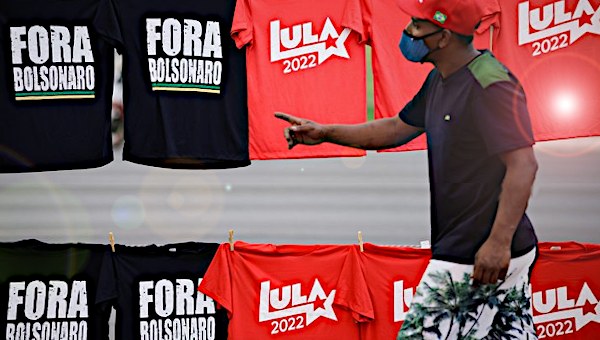
Continuing Corruption Under Bolsonaro
Another factor that might benefit Lula are a number of corruption scandals that hit the Bolsonaro administration. The most serious concerns the Ministry of Education, causing the evangelical Milton Ribeiro to resign his post this past March 28. A recording of a phone call involving Ribeiro, published by the newspaper Folha de São Paulo, unveiled a scheme in which two evangelical preachers negotiated funds from the ministry to local mayors in exchange for bribes. After the audio transcript was published, various mayors who rejected the demanded bribes came forward and talked to the media about the scheme.
The bribes were paid to the preachers’ churches in the form of purchases of large numbers of bibles, and in at least one case, one of the preachers demanded to be paid with a gold bar. In said phone call, Ribeiro stated that at the behest of Bolsonaro, these two preachers would distribute funds from the ministry.
When the scandal broke, considerable pressure was exerted by other evangelical churches for Ribeiro to resign, since other evangelicals who were not involved nevertheless became associated with the scandal in public or were angry that they had not been part of the scheme. Investigations in the case are ongoing, and there is some probability that it will lead to an investigation by a parliamentary commission.
The question of Bolsonaro’s personal connection arose, and the Office of Internal Security under hardliner General Augusto Heleno tried to keep secret who had visited the presidential palace, citing security issues. Bolsonaro boasted that those who visited will only be revealed in 100 years, but the next day Heleno gave in to legal pressure, and published data indicating that one of the two preachers in question visited various offices in the Presidential Palace 35 times during Bolsonaro’s occupancy.
Another scandal broke a week later and is also linked to educational funds. Eighty percent of a national fund for school equipment went to one company with personal links to the president of the Brazilian Parliament, Artur Lira. Many schools in his home region in the northeast of the country have neither running water nor internet access, yet they received robot kits that were bought at inflated prices with ministry funds from the company with connections to Lira.
These schemes reveal the way the Bolsonaro government exchanges political support for financial favours, a classic example of how Brazilian politics has operated for decades, and one feature of the political system that Bolsonaro vowed he would abolish in his 2018 campaign.
The belief among the population that Bolsonaro will combat corruption no longer holds sway, and recent surveys reveal that more voters associate Bolsonaro rather than Lula with corruption.
But there is another danger for Lula, should he win. Similar to Dilma Rousseff who won the presidency in 2014, Lula might have to deal with a very conservative composition of Congress, which will make it difficult to govern. Many voters might choose Lula as president but could also vote for right-wing parties for Congress.
Given the weakness of the left in many regions, reflected in the local elections of November 2020, a conservative composition of Congress is a likely outcome. In this way, the next elections might serve in getting rid of Bolsonaro as president, but the grip of the crony elites with their vested interests that promote conservative values might be harder to loosen. •


